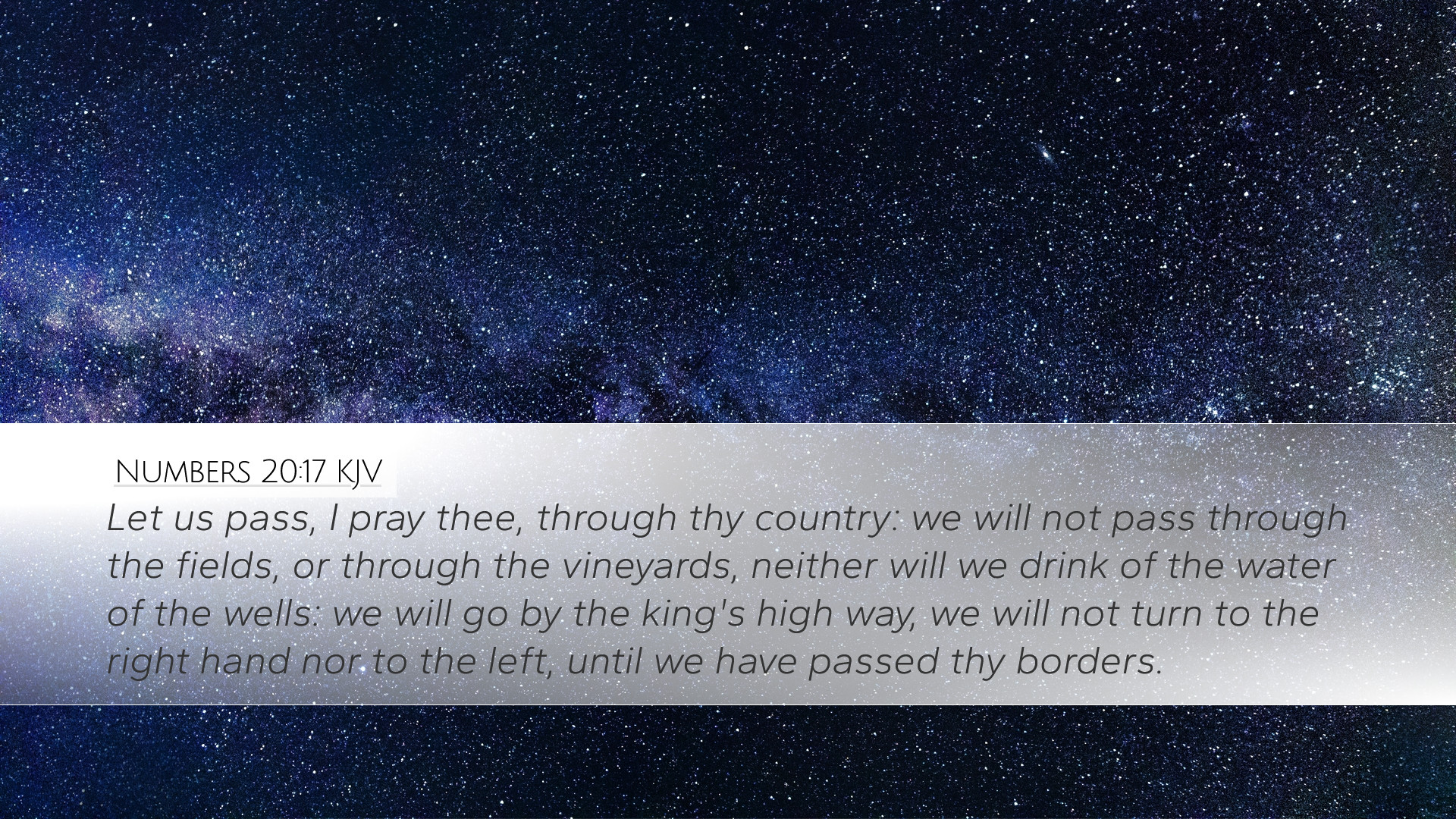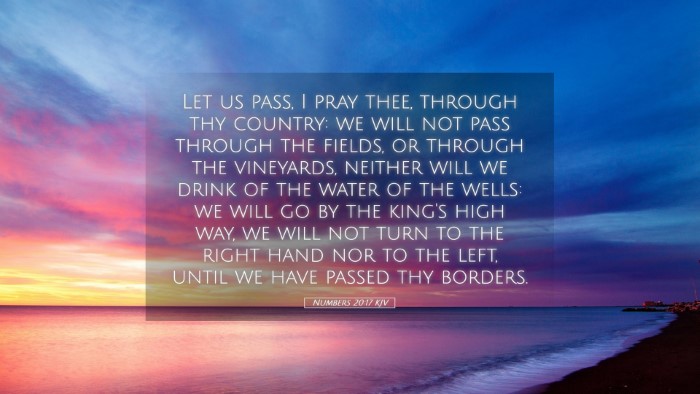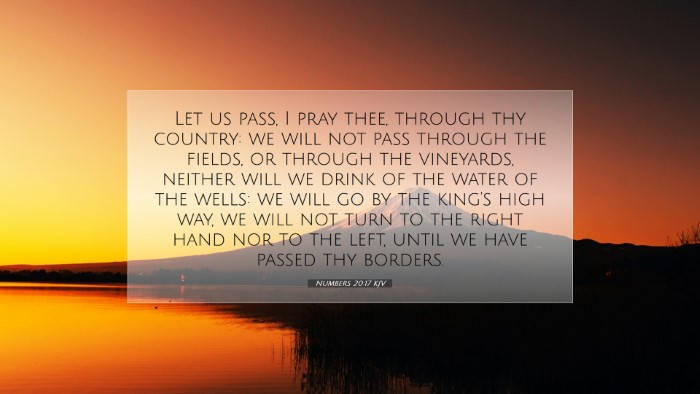Commentary on Numbers 20:17
Verse: "Let us pass, I pray thee, through thy country: we will not pass through the fields, or through the vineyards, neither will we drink of the water of the wells: we will go by the king's highway, we will not turn to the right hand nor to the left, until we have passed thy borders."
Introduction
This significant verse in Numbers 20 captures the moment when the Israelites, journeying through the wilderness, seek passage through the land of Edom. This request is pivotal in understanding the dynamics between Israel and Edom, as well as the broader themes of obedience, leadership, and divine guidance during the wilderness wanderings. This commentary combines insights from Matthew Henry, Adam Clarke, and Albert Barnes to provide a rich theological reflection suitable for pastors, students, and theologians.
Contextual Background
The events recorded in Numbers 20 occur towards the end of the Israelites' 40 years in the wilderness. This chapter details various incidents, including the death of Miriam, the sin of Moses and Aaron, and the request for passage through the land of Edom. Understanding the historical and geographical context provides crucial insights into the verse at hand.
Historical Context
- Israel's Journey: The Israelites had been wandering in the wilderness due to their disobedience and lack of faith. Their journey was characterized by trials that shaped their identity as God's chosen people.
- Edom's Significance: Edom, descending from Esau, had a complicated relationship with Israel. Historically, they were both related; however, their paths diverged significantly after the division of Isaac's blessing.
Geographical Context
The mention of "the king's highway" indicates the main trade route in the region, which underscores the Israelites’ intention to travel respectfully and peacefully through Edom. This shows their desire to avoid conflict and their commitment to God's laws regarding treatment of others.
Verse Analysis
In this verse, several key themes emerge that bear theological significance:
1. The Plea for Peaceful Passage
The Israelites’ request to "pass through thy country" reflects their intention to maintain peace despite their history with Edom. As Matthew Henry notes, the Israelites were not seeking possession or conflict but a swift passage that respected Edom's territory.
Adam Clarke emphasizes the importance of this request, indicating that the Israelites were determined to show respect for Edom’s borders, which should remind us of the importance of honoring the rights of others in our interactions.
2. A Lesson in Boundaries
The stipulation that they would not "pass through the fields, or through the vineyards" reflects an understanding of boundaries and respect for others' property. This adherence to boundaries is critical in Christian ethics, highlighting the foundational principle of loving one's neighbor.
Albert Barnes underscores that the Israelites’ approach was not merely a practical consideration but also a manifestation of their identity as God's people who are called to righteousness.
3. Divine Guidance in Leadership
This passage highlights the role of divine direction in leadership. The leaders of Israel, recognizing their need for God's guidance, make a humble and respectful request. This can serve as a model for contemporary leaders who must seek God’s wisdom in their decisions.
Henry asserts that the way Moses approaches the Edomites serves as an example of humility and prudence in leadership, vital traits for those in positions of authority.
Theological Implications
This verse offers profound theological implications that resonate with various aspects of faith and practice:
1. Respect for Authority
The Israelites’ request to Edom teaches the importance of respecting the authority and territory of others. In contemporary Christian living, this principle extends to how believers interact with secular authorities and different cultural groups.
2. The Nature of God’s People
The character of the Israelites as God's chosen entity is exhibited in their demeanor; they are called to be a light to the nations. Clarke notes that their reliance on God’s providence is at the forefront, encouraging believers to trust in divine provision and guidance.
3. The Significance of Peace
Seeking peace rather than conflict is a theme throughout Scripture. The request made by the Israelites serves as a marker for the desire for peace even in hostile territories. Barnes points out that Christians are called to be peacemakers, echoing the beatitudes found in Matthew 5.
Practical Applications
In light of Numbers 20:17, the following applications can be considered for contemporary readers:
- Conflict Resolution: The Israelites’ respectful approach serves as a model for resolving conflict in personal and communal settings.
- Community Engagement: Engaging with neighboring communities respectfully and seeking peaceful solutions can foster trust and goodwill.
- Leadership Principles: For pastors and leaders, modeling humility and seeking God's guidance can lead to wise and effective leadership.
Conclusion
In summary, Numbers 20:17 encapsulates a significant moment in the Israelites’ journey, highlighting their commitment to peace, respect for boundaries, and reliance on divine guidance. The insights from public domain commentaries enrich our understanding and provide meaningful reflections applicable to the lives of pastors, theology students, and scholars. As we contemplate this verse, may we be inspired to embody the principles of respect, humility, and peace in our own contexts.


